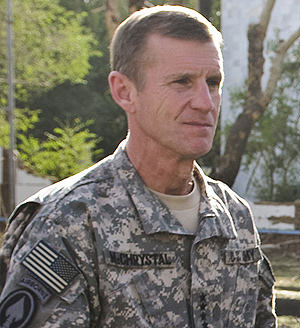McChrystal Discusses Afghanistan Plan
America's top brass in Afghanistan, Gen. Stanley McChrystal, sat down for a talk with the Financial Times last week about his strategy in the South Asian nation, how long he thinks U.S. troops will remain there and the possibility of the Taliban's participation in the Afghan government.
America’s top brass in Afghanistan, Gen. Stanley McChrystal, sat down for a talk with the Financial Times last week about his strategy in the South Asian nation, how long he thinks U.S. troops will remain there and the possibility of the Taliban’s participation in the Afghan government. The FT on Monday published an edited transcript of the interview. — KA
Your support matters…Financial Times:
FT: You say clearly in [your] assessment that a foreign army can’t win an insurgency, that there has to be improvements in governance to win over the support of the population. At the same time it’s clear that there’s a lot of doubts about the ability of the present government to do that. What do you need to see President Karzai doing to actually ensure your strategy can work?
Gen McChrystal: It’s not so much what I have to see; it’s what the Afghan people have to see. They will judge the credibility and legitimacy of the Karzai government – and that applies down to the local level, the provincial level, district level – they will apply their own metric, or assessment, on whether that’s legitimate for their needs. And it will be a little different in different parts of the country. So I think what we need to see is that progress continue. Much of what fuels most insurgencies is their ability to leverage a, or create a seam between the people and the government. So what we’re looking to do is to continue to see that close.
FT: How is it going to be possible to close that gap, though, when there’s such a deficit of legitimacy in the existing government, in the eyes of so many Afghans, particularly in the south of the country where the insurgency is greatest? How do you persuade people that they should have faith in what you’re offering – the carrots, if you will – compared to the sticks that the Taliban can bring to bear, so easily, in so many parts of the country?
Gen McChrystal: That is a key point. The first is to characterise the insurgency here. The insurgency here is most notable with the Quetta Shura based Taliban, that part of the Taliban. They were the government back in the ’90s. They are deeply unpopular, and so they don’t offer much. They don’t have the ability to offer development. Their vision in the past that they demonstrated was very hard on a tremendous amount of the population. So as shown in their polls, they are very, very deeply resented by most of the people. But they do, as you’ve said correctly, they do have the ability to coerce. And they have the ability to help create a seam between the people and the government through the coercion, but also the ability to support narco-activities, from which people can make money, and provide local rule of law.
What the government has to do is really two things. First they need to protect the people. They need to give the people enough security so that they have the opportunity to choose. If a person can’t choose, there’s no point discussing choices with them. We’ve got to create for them the opportunity to choose. And then the government has got to make a case for its own ability to meet the needs and desires of the people. They have to then win the argument with the insurgency for the support of the people.
Independent journalism is under threat and overshadowed by heavily funded mainstream media.
You can help level the playing field. Become a member.
Your tax-deductible contribution keeps us digging beneath the headlines to give you thought-provoking, investigative reporting and analysis that unearths what's really happening- without compromise.
Give today to support our courageous, independent journalists.






You need to be a supporter to comment.
There are currently no responses to this article.
Be the first to respond.